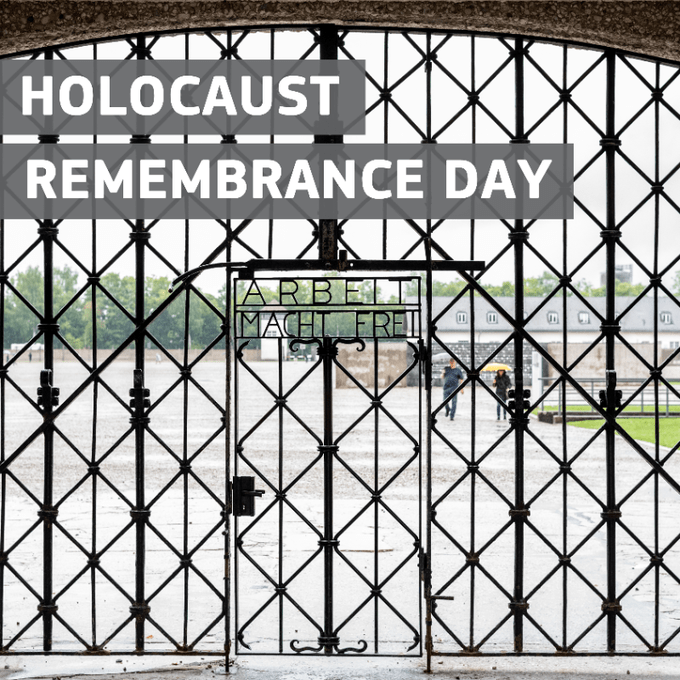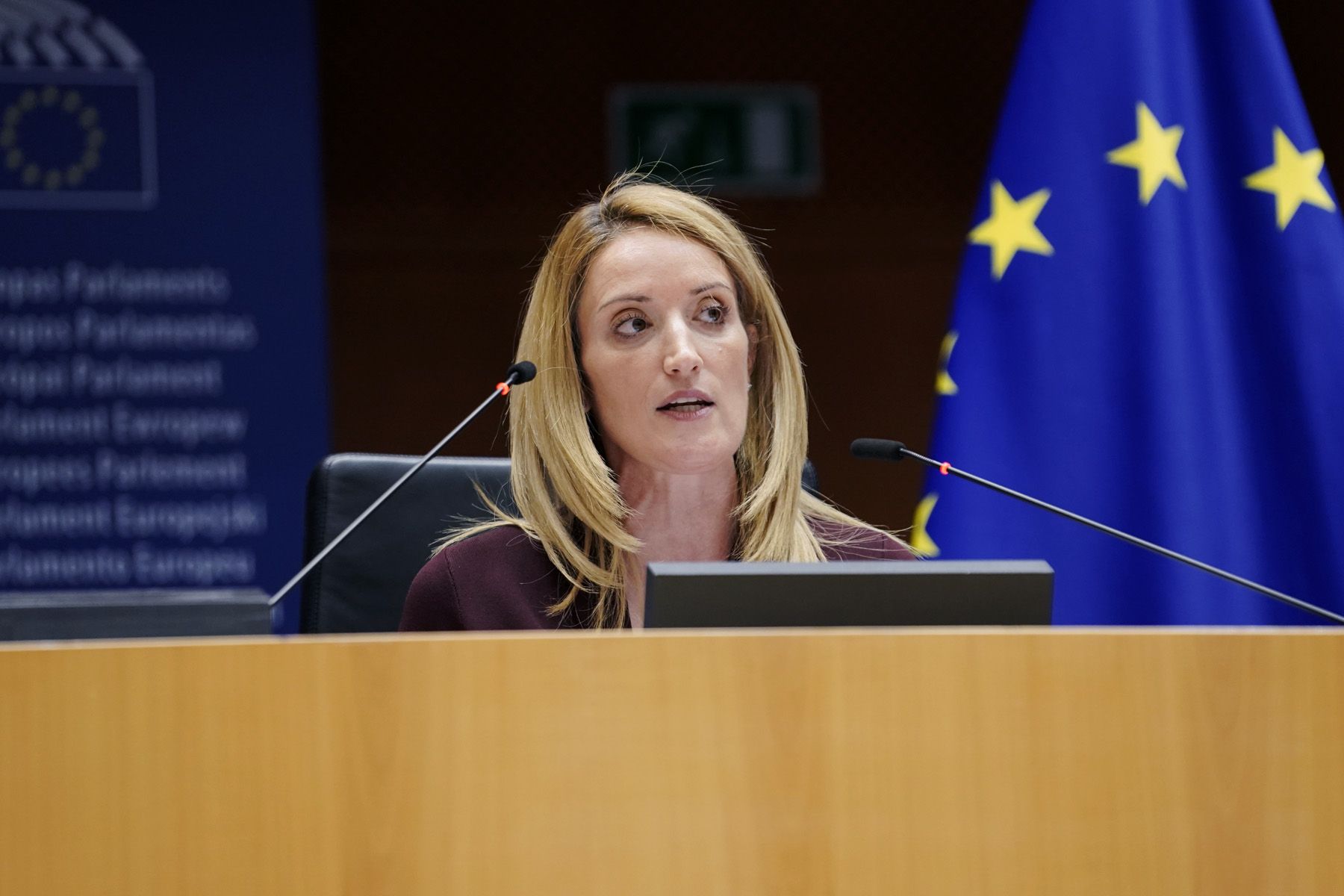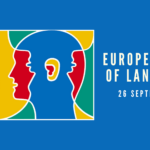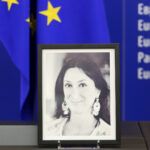27 January marks the International Holocaust Remembrance Day and the 78th anniversary of the liberation of the Nazi concentration camp Auschwitz-Birkenau. Ahead of the International Holocaust Remembrance Day, President von der Leyen said:
“We must never forget the six millions of Jewish women, men and children, and all other victims, among them hundreds of thousands of Roma, murdered during the Holocaust.
This year will be marked by remembering Jewish resistance and insurgence in Nazi-occupied Europe. We will commemorate the 80th anniversary of major uprisings, like the Warsaw Ghetto uprising on 19 April 1943, which became a symbol of Jewish resistance and the brutality of the Nazi regime. But also other resistance acts like in Belgium, where, that same day, three members of the resistance – Robert Maistriau, Youra Livchitz and Jean Franklemon – sabotaged a train going to Auschwitz with Jews sentenced to death. Others could later escape from that train, 120 survived. There were other revolts that might be less talked about – in concentration and death camps in Treblinka and Sobibor or the Białystok Ghetto. Because Jewish victims were not passive; they organised resistance against the Nazis.
Still today, and forever, we can learn from the strength, courage and the determination of these poorly armed Jewish fighters and partisans, who carried out revolts successfully against all odds, and an almost certain death. They fought in the name of justice. They were determined to fight back.
As stated by Auschwitz survivor Elie Wiesel: “The question is not why all the Jews did not fight, but how so many of them did. Tormented, beaten, starved, where did they find the strength – spiritual and physical – to resist?”
We cannot remain silent when injustice takes place, when massacres are committed. We have to call out antisemitism, antigypsyism and all forms of hatred and discrimination – be it on the grounds of racial or ethnic origin, religion or belief, gender, sexual orientation, age or disability.
Antisemitism led to the Holocaust but did not end with it. Antisemitism is again on the rise in Europe. So is Holocaust denial, distortion, trivialization, which is fueling antisemitism and has corrosive effects for collective European memory and cohesion.
Remembrance is not an aim in itself. We must go a step further. We must foster Jewish life. Europe can only prosper when its Jewish communities prosper too. We will work towards a European Union free from antisemitism and any form of discrimination. For an open, inclusive and equal European society.”
International Day of Commemoration of the Victims of the Holocaust at the European Parliament
Israel’s President Isaac Herzog called on MEPs to work to eradicate antisemitism in Europe and adopt the International Holocaust Remembrance Alliance’s definition of antisemitism.
Opening the commemoration ceremony, European Parliament President Roberta Metsola called the Holocaust “history’s greatest crime. A crime intended to wipe out a people from the earth. A crime designed to inflict horror on generations. A crime that has shaped our modern European project, into an embodiment of the timeless promise: Never again”.
She pointed out that the Holocaust did not happen overnight and that alarm bells should have rung long before they eventually did. Despite the years that have gone by, it remains essential to continue commemorating the Holocaust because antisemitism still exists, and because this is the last generation to bear witness to first-hand accounts from Holocaust survivors, President Metsola continued.
The European Parliament will always defend the values of respect, human dignity, equality and hope, she pledged, adding that Parliament will never be silenced in its fight to defend human values and push back against hate and discrimination.
Israel’s President Herzog opened his address by saying: “I stand before you today as the President of the State of Israel, the democratic nation-state of the Jewish People, but my heart and thoughts are with my brothers and sisters killed in the Holocaust, whose only crime was their Jewishness and the humanity they bore.”
“Europe could not be what it is without the Jews”, President Herzog said, but antisemitism, “like an autoimmune disease”, made Europe attack part of its own DNA, and a shared millennia-long history was erased. He emphasised that this antisemitism did not emerge in a vacuum but that “the Nazi death machine would not have managed to carry out its nightmarish vision had it not met soil fertilised with Jew-hatred.” For President Herzog, antisemitism remains, and Holocaust denial still exists, in new guises and spread through new channels – particularly on the internet. “The distance between a Facebook post and the smashing of headstones in a cemetery is shorter than we would think,” he said. “Deranged tweets can kill. They really can.”
Europe has a vital role to play in pushing back against this antisemitism, he pointed out. Calling on MEPs not to stand by in the face of rising antisemitism, President Herzog implored them to “read the warning signs, detect the symptoms of the pandemic of antisemitism, and fight it at all costs. You must ensure that every Jew wanting to live a full Jewish life in your countries may do so safely and fearlessly.” Through education, legislation and any other tools at their disposal, MEPs and the EU should commit to eradicating racism, hatred, and antisemitism in all their forms, he said. President Herzog also called on the European Parliament to fully adopt the International Holocaust Remembrance Alliance’s definition of antisemitism.
He underscored that “criticism of the State of Israel must not cross the line into negation of the very existence of the State of Israel, the nation-state of the Jewish people.” Speaking of Europe-Israel relations, he said the “State of Israel and Europe are bound together in an unbreakable bond. Our shared interests, and even more so, our shared values, dictate our present and shape our future.” He called on MEPs and the EU to broaden, deepen, and strengthen their partnership to better fight the contemporary challenges Israel and the EU face, including the threat posed by Iran to its own people, to Israel and in the wider Middle East and Ukraine.
Contexto
La Comisión presentó el 5 de octubre de 2021, por primera vez en la historia, una Estrategia de la UE de Lucha contra el Antisemitismo y Apoyo a la Vida Judía a fin de apoyar a los países y a la sociedad civil de la UE en su lucha contra el antisemitismo. La conmemoración del Holocausto es un pilar esencial de los esfuerzos por velar por que nunca olvidemos nuestra historia.
Este año, como parte de sus iniciativas para señalar el Día Internacional de Conmemoración de las Víctimas del Holocausto, la Comisión Europea organizó el 23 de enero la conferencia de conmemoración del Holocausto «Conmemorar el pasado. Construir el futuro», en colaboración con la presidencia sueca del Consejo, la presidencia sueca de la Alianza Internacional para el Recuerdo del Holocausto (IHRA) y las organizaciones centrales judías con sede en Bruselas.
Como medida de sensibilización ante la distorsión del Holocausto y para contrarrestar este fenómeno, la Comisión ha puesto en marcha y sigue fomentando la campaña a escala mundial #ProtectTheFacts junto con la Alianza Internacional para el Recuerdo del Holocausto (IHRA), la UNESCO y las Naciones Unidas.
En 2005, la Resolución de la Asamblea General de las Naciones Unidas sobre la recordación del Holocausto (60/7) designó el 27 de enero como Día Internacional de Conmemoración de las Víctimas del Holocausto. El 27 de enero de 1945, las fuerzas aliadas liberaron el campo de concentración y exterminio de Auschwitz-Birkenau.
La Resolución insta a todos los Estados miembros de las Naciones Unidas a que honren la memoria de las víctimas del Holocausto y fomenten la elaboración de programas educativos sobre la historia del Holocausto a fin de evitar futuros actos de genocidio. También reclama que se preserven activamente los lugares del Holocausto como los campos de exterminio, los campos de concentración, los campos de trabajo forzoso y las prisiones nazis.
En enero de 2022, las Naciones Unidas adoptaron una nueva resolución en la que condenaban la negación y la distorsión del Holocausto. En ella se insta a los miembros de las Naciones Unidas y a las empresas de redes sociales a que adopten medidas activas para luchar contra el antisemitismo y la negación o distorsión del Holocausto.
La Comisión Europea y los Estados miembros de la UE se han comprometido a luchar contra el antigitanismo como parte del marco estratégico de la UE para los gitanos y de la Recomendación del Consejo relativa a los gitanos. El 9 de enero de 2023 se adoptó un primer informe de evaluación de los marcos estratégicos nacionales de los Estados miembros para los gitanos.
Como parte del programa Ciudadanos, Igualdad, Derechos y Valores (CERV), la Comisión Europea destinará en 2023 más de 10 millones de euros a la financiación por la UE de proyectos sobre memoria histórica europea. Se dará especial prioridad a los proyectos destinados a reforzar la memoria histórica del Holocausto y la educación y la investigación sobre el Holocausto, o a luchar contra la negación y la distorsión del Holocausto. Se puede encontrar más información aquí.
Más información
Fuente: Comisión Europea
Actividades de la UE en materia de lucha contra el antisemitismo
Background
The European Commission put forward the first-ever strategy on combatting antisemitism and fostering Jewish life on 5 October 2021, to support EU countries and civil society in their fight against antisemitism. Holocaust remembrance is an essential pillar of efforts to ensure that we never forget our history.
This year, as part of its efforts to mark International Holocaust Remembrance Day, the European Commission organised on 23 January the Holocaust remembrance conference “Remembering the Past. Shaping the Future”, in partnership with the Swedish Presidency of the Council, the Swedish Presidency of the International Holocaust Remembrance Alliance (IHRA) and Brussels-based Jewish umbrella organisations.
To raise awareness and counter Holocaust distortion, the Commission has launched and continues to work on a global campaign to #ProtectTheFacts, together with the International Holocaust Remembrance Alliance (IHRA), UNESCO and the United Nations.
In 2005, the United Nations General Assembly Resolution on the Holocaust Remembrance (60/7) designated 27 January as the international commemoration day in memory of the victims of the Holocaust. On 27 January 1945, the Allied Forces liberated the concentration and death camp of Auschwitz-Birkenau.
The resolution urges every member of the United Nations to honour the memory of Holocaust victims and encourage the development of educational programs about Holocaust history, to prevent future acts of genocides. It calls for the active preservation of Holocaust sites such as Nazi death camps, concentration camps, forced labour camps and prisons.
In January 2022, the UN adopted a further resolution, condemning denial and distortion of the Holocaust. This resolution calls urges members of the UN and social media firms to take active measures to combat antisemitism and Holocaust denial or distortion.
The European Commission and EU Member States have committed to work against antigypsyism as part of the EU Roma Strategic Framework and the Council Recommendation on Roma. A first assessment report of the Member States’ National Roma Strategic Frameworks was adopted on 9 January 2023.
As part of the Citizens, Equality, Rights and Vales (CERV) Programme, the European Commission will in 2023 provide over €10 million of EU funding to support projects on European Remembrance. A particular priority will be given to projects that aim to strengthen Holocaust remembrance, education and research or combat Holocaust denial and distortion. More details here.
More Information
Source: European Commission








Leave a Reply